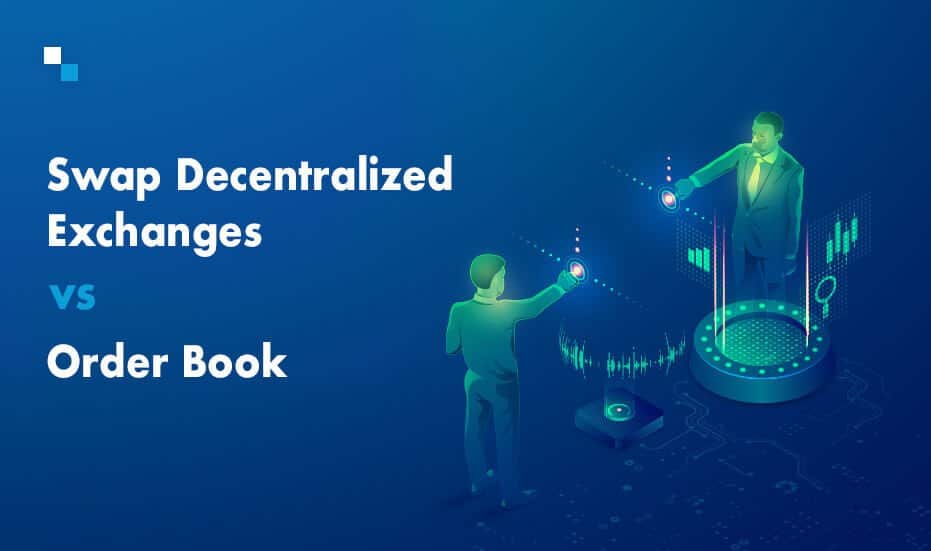In January 2021, the trading volumes on Decentralized exchanges (DEXs) hit a record high of $50 billion. Interestingly, almost 45% of the trading volume was contributed by Uniswap, the leading DEX that relies on liquidity protocol rather than order books. As the DEX market matured, DEX’s underwent an evolution and moved away from order books DEXs to Swap DEXs. This led to a sudden rise in the demand for decentralized exchange development services.
Let’s find the difference between the two.
Oder Book Decentralized exchanges
An order book compiles all the buy and sell orders of assets in a single place. The depth of an order book is determined by the price spread between the buy/sell orders. This further determines the price of a particular asset on a particular exchange.
In most of the order book DEXs, the users’ assets remain off-chain but the information is maintained on-chain on the order books for quicker trades.
a) Derivative product based DEXs let users trade derivatives in a decentralized environment.
b) Order book DEXs are slower compared to Swap DEXs. To overcome this, a matching engine for efficient buying and selling is designed. This helps overcome the order matching speed issues.
c) The speed of the trade can also be improved by matching the orders on on-chain however moving the funds off-chain always.
d) On-chain smart contracts can be used for order matching. This minimizes the risk of someone manipulating the orders.
e) Privacy of the transactions on DEXs can also be improved by using zk-SNARKs to validate transactions.
f) Web-based APIs can be used to give users a familiar experience.
g) Decentralized Margin trading can also be facilitated where DEX users can borrow funds and amplify their returns 3X,10X or even 100x.
Some disadvantages of order book DEXs that led to the evolution to Swaps:
- The blockchain could be clogged with loads of transactional data of transactions thereby increasing the times significantly.
- Due to the higher transaction load, the order matching waiting also increases.
- The order book manipulation is one of the most troubling issues.
- Due to the interoperability issues between multiple blockchains, DEXs are unable to support many crypto assets.
- Trade collisions in order book DEX are a major cause of higher transaction fees.
What challenges does a DEX operator face?
- Low liquidity is one of the biggest challenges for DEXs.
- On-chain DEXs have low throughput compared to centralized exchanges. Both low throughput and low liquidity problems go hand in hand.
- Fiat on-ramp is not possible on DEX’s. A user needs to buy crypto from a centralized exchange and then use that to trade on DEX.
- Order book DEXs are susceptible to front-running issues.
Before you plan to find your decentralized exchange development partner, consider Swap platforms.
Swap Decentralized exchanges
Uniswap is the next generation decentralized exchange. Instead of using an order book, it uses liquidity pool protocol to maintain liquidity and for determining price. These DEXs use smart contracts to facilitate direct trade between user’s wallets.
- An underlying pool where liquidity providers pool in their assets is used to swap any two assets seamlessly.
- As these DEXs use smart contracts to facilitate trade, the environment is completely permission less and trustless.
- The liquidity providers receive incentives in the form of a percentage of trading fees and native tokens of the DEX.
- Different protocols like Automated Market Makers (AMM) and Proactive Market Maker (PMM) have been used to optimize the available liquidity.
- Uniswap employs 50:50 trading pair ratios. On the other hand, DEXs like Balancer employ ratios like 80:20 or 70:30 which helps them overcome impermanent losses.
- These exchanges address the blockchain interoperability issues by running on a stack of smart contracts which run on different blockchains.
- Another mechanism used to facilitate liquidity across orders is known as ring trades. This helps in quicker order settlements as the liquidity is shared across orders and not just a single trading pair.
Undoubtedly, swap decentralized exchanges are an evolution over order book DEXs. These are designed in a very different manner and thus require a lot of development effort. That is because the protocol development for swap types DEXs requires a lot of development precision and must be thoroughly audited.
Conclusion
Antier Solutions houses more than 100 blockchain developers who are working tirelessly to build top-notch DEX networks and a range of other dApps. Reach out to us and explore more about our decentralized exchange development expertise.
Connect with our subject matter experts to share your business needs.







